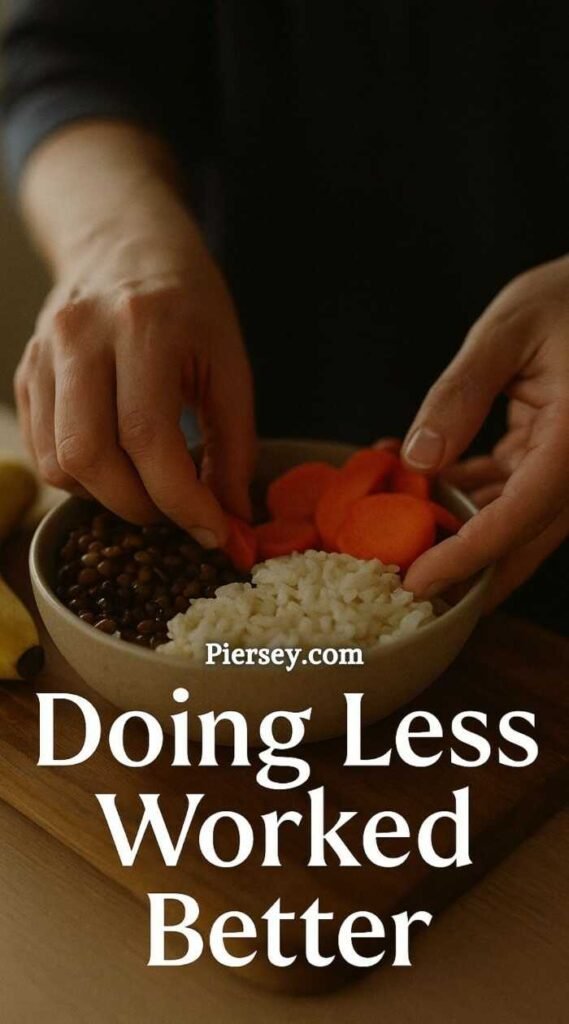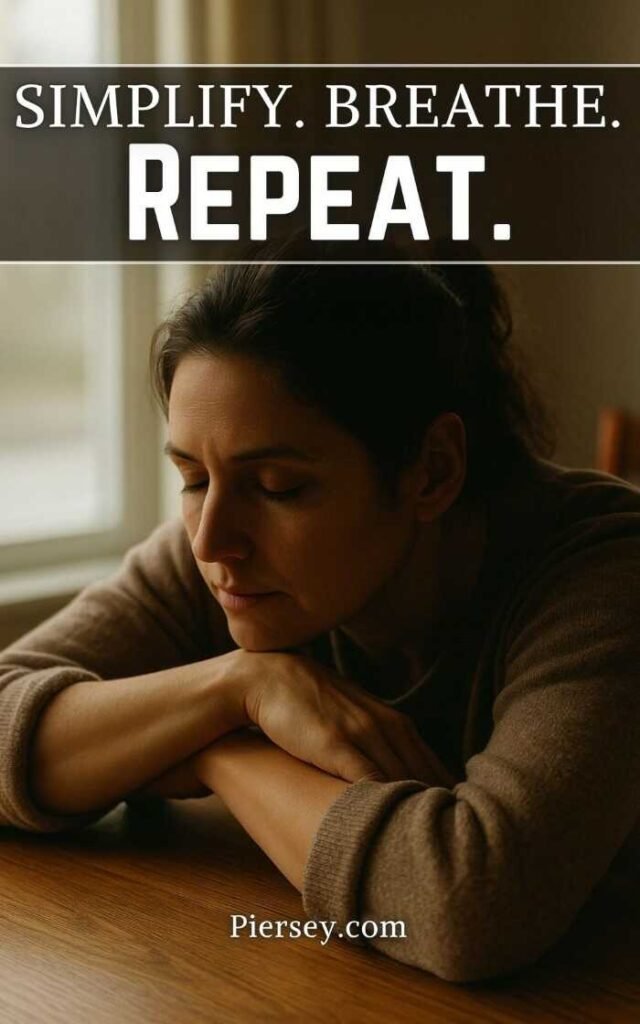Ever look back and cringe at the way you used to “start over”?
Because I do. All the time.
I can still picture it — that overconfident version of me standing in the kitchen, trashing the “bad” food, opening a fresh notebook, and promising myself that this time I was going to fix everything.
New rules.
New diet.
New morning routine.
New version of me.
It always felt so dramatic — like the first scene of a redemption movie.
And for about two weeks, I’d nail it.
But it never lasted.
Because I wasn’t changing my life; I was just hitting “restart” over and over again.
If I’m honest, I made weight loss way harder than it ever needed to be. I didn’t need another perfect plan. I didn’t need a pile of supplements or a motivational playlist. I needed peace. I needed rhythm. I needed to stop sprinting.
Now, years later, I finally get it. I’m still overweight, still on the journey — but this time, it’s slow. It’s calm. And for once, it’s working.
I follow a simple, plant-based, high-carb, low-fat diet — mostly rice, lentils, fruit, and vegetables. I don’t track calories. I don’t overthink anything. I just live.
And somehow, that’s where the results finally started to come from.
This post isn’t about hacks or secrets.
It’s just everything I wish I knew before I ever tried to lose weight.
🎥 If you’d rather see how I talk through this, the vlog’s just below.
The Moment I Stopped Trying to Fix Everything Overnight
When I first started, I treated weight loss like a crisis.
You know that panicked feeling when you’ve just had enough — when you’re disgusted with yourself, tired of clothes not fitting, angry that you let things get so far? That was me, on repeat.
So I’d go all in.
New diet. New gym membership. New “me.”
I’d spend hours reading articles, calculating macros, and trying to “master” the science of fat loss. It felt productive — like I was finally in control.
But my actual days were chaos.
I’d wake up late, skip breakfast, power through the day on caffeine, and then binge because my body was starving. My sleep was wrecked. My emotions were all over the place.
It was like trying to build a house while the foundation was on fire.
I didn’t need more control — I needed calm.
It took me years to learn that.
These days, my foundation is boringly simple. I eat almost the same meals every day. I walk in the woods every morning — no music, no headphones, just quiet. That walk clears my head better than any “mindset reset” ever did.
And funny enough, that simple walk — that consistency — has done more for my body than any fancy program ever could.
I mentioned something similar in another post about finding stability and staying consistent.
Because once you stop treating change like an emergency, you actually give it room to stick.
Motivation Isn’t Coming — And That’s Okay
For years, I waited for motivation like it was a bus that would eventually arrive.
I’d tell myself, “Once I’m in the right headspace, then I’ll start.”
But that day never came.
We’re not living in a movie — there’s no dramatic moment where your life magically flips. Most days, I didn’t feel ready. I wanted to scroll, snack, and delay things “until Monday.”
And when I finally did start, it wasn’t because I felt inspired — it was because I was tired of waiting.
I built systems instead of chasing feelings.
I started prepping simple food — rice, beans, veggies, fruit. I kept my environment uncluttered. No junk food in the house, no “cheat” mindset.
And I made walking non-negotiable.
Some days I’d plan to walk an hour and only manage half. But I still showed up.
That consistency — not motivation — was what changed me.
Motivation fades, but rhythm doesn’t.
Once I stopped waiting to feel ready and just acted ready, everything got easier.
The pressure melted. My routine started to feel natural.
And for the first time, I wasn’t forcing it.
I mentioned something similar in another post about how slow progress builds peace.
Because sometimes the most powerful transformation happens quietly — when you stop waiting for perfect conditions and just begin.


Why I Had to Let Go of “All or Nothing” Thinking
I used to think being healthy meant being perfect.
No sugar. No oil. No snacks. No fun.
Every time I restarted, I’d make it all about restriction.
And for a few days, I’d feel amazing — clean, strict, “in control.”
Then, the crash would hit.
You can’t live your life inside a set of rules that tight.
I’d end up binging on the foods I swore off, then beat myself up for it, and promise I’d “do better” tomorrow. That cycle lasted years.
What I finally learned was that food wasn’t the problem — my extremes were.
Once I started eating repetitive, balanced, high-carb, low-fat meals, everything got quiet.
No mental tug-of-war. No guilt.
I stopped seeing food as a test and started seeing it as fuel.
Now, I eat the same rice bowls most days. I don’t get bored because it’s simple — predictable.
My digestion stays happy, my energy stays stable, and my brain isn’t constantly thinking about what’s next.
There’s a peace in repetition that I never understood until now.
It’s not boring — it’s freedom.
The Weight of Comparison
It’s wild how heavy comparison can feel.
I used to carry it everywhere — scrolling through fitness accounts, watching transformation videos, and wondering why I wasn’t progressing like them.
The truth? I was comparing my beginning to someone else’s middle — or worse, their highlight reel.
You know those perfectly lit gym photos, abs flexed, captions about “grind” and “discipline”? Half those people were running on fumes. Some were overtraining, under-eating, miserable behind the camera.
But I didn’t know that.
I thought I was failing because I couldn’t keep up.
That kind of comparison quietly destroys your joy.
I had to step back. I unfollowed half the accounts that made me feel like I wasn’t enough. I stopped watching other people’s routines and started paying attention to my own.
And slowly, that envy turned into clarity.
I realized I wasn’t behind — I was just moving at my pace.
And when I finally accepted that, progress started to feel peaceful.
I talked more about that in another post about food freedom and self-acceptance.
Because when you stop competing with strangers on the internet, you finally start hearing yourself again.
The Way I Talked to Myself Was Destroying Everything
For years, I thought my biggest problem was food.
But it wasn’t.
It was me — or rather, the way I spoke to myself.
Every time I slipped, that cruel little voice would show up.
“You always ruin it.”
“You’ll never stick to anything.”
“You don’t have what it takes.”
It’s wild how fast that voice can spiral.
One missed workout became a “failure.”
One bad meal became a “relapse.”
And before I knew it, I was back to day one — again.
You can’t build anything good on top of self-hate.
I used to think guilt was motivation, but guilt is just glue — it keeps you stuck.
The change came slowly. I started treating myself like someone worth helping instead of fixing. I stopped calling myself lazy. I started saying, “It’s okay, you’re learning.”
It sounds small, but it’s huge.
Once I softened my self-talk, everything else followed.
The pressure dropped. My habits stopped feeling like punishment.
It wasn’t about being “perfect” anymore — it was about showing up for myself like I actually mattered.
And that’s the thing — weight loss didn’t get easier because I got stronger.
It got easier because I stopped tearing myself apart.
I wrote more about this in another post about rebuilding discipline without burnout.
Because compassion doesn’t make you weaker — it’s what makes consistency possible.
The Nights That Broke Me (And What They Taught Me)
There were nights I honestly thought I’d never get it right.
Nights where I’d sit on the edge of my bed, completely drained, staring at the wall, wondering how I could try so hard and still be stuck.
I remember one night after a particularly bad binge — I’d promised myself I was done with emotional eating, and then I just… lost it. I sat there with that mix of shame and numbness that anyone who’s been through it knows too well.
I remember thinking, “You’ve failed again. You’ll always fail.”
And then something weird happened — I didn’t start over the next morning.
I just kept going.
No punishment, no detox, no reset.
I got up, had breakfast, went for my walk, and moved on.
That was the first time I realized failure only becomes permanent when you stop showing up.
You don’t have to erase your mistakes. You just have to stop letting them define you.
Those dark moments — the ones I used to hate — they’re what taught me patience.
They taught me that sometimes growth doesn’t look like progress.
Sometimes, it looks like not quitting when it hurts.
How Slow Progress Saved Me
If there’s one thing I wish I could tattoo on every diet ad, it’s this:
Fast doesn’t last.
For years, I wanted transformation to feel dramatic — I wanted that “wow” moment, that viral before-and-after.
But every time I lost weight fast, I gained it back even faster.
What finally worked was slowing down.
Now, I eat the same meals every day. Rice, lentils, fruit, vegetables.
I walk, I rest, I let my body breathe.
There’s nothing flashy about it — no “30-day challenge,” no secret.
Just calm, consistent rhythm.
It’s quiet. Predictable. Boring, even.
And it’s the best thing that’s ever happened to me.
Because once the pressure of “fast” disappeared, I could finally focus on feeling good instead of just looking better.
There’s this peace that comes when you stop rushing yourself.
You start sleeping better. Digestion improves. Your mood stabilizes.
And suddenly, you realize that “slow” isn’t the enemy — it’s the fix.
I talked about this in another post about simplifying food for better results.
Because the less chaos you feed your body, the more clearly it responds.
When I Stopped “Starting Over”
I used to be the queen of starting over.
Every Monday was a fresh slate. Every slip-up meant a full reset.
But all that “starting over” was just disguised perfectionism.
I didn’t need another fresh start — I needed continuity.
One day, I decided to just… not restart.
If I overate, I didn’t spiral.
If I skipped the gym, I didn’t make excuses.
I just continued — as if nothing dramatic had happened.
That tiny shift changed everything.
Because momentum isn’t built on perfect streaks — it’s built on tiny recoveries.
The truth is, we think we need a reset because we don’t know how to sit in imperfection.
But the real transformation happens in that middle ground — when it’s messy and you keep going anyway.
That’s how consistency is born. Not from fire and motivation, but from quiet refusal to quit.
I mentioned this before in another post about building sustainable habits after 40.
Because that’s what I’ve learned — strength isn’t about how hard you can push. It’s about how long you can stay.
Rebuilding Trust with My Body
One of the hardest parts of long-term dieting is the disconnect.
You lose touch with your hunger cues. You second-guess everything — am I hungry, or just bored? Is this craving real, or am I emotional?
I lived in that confusion for years.
I’d swing from control to chaos — extreme fasting one week, comfort food the next.
I didn’t trust my body, and honestly, it didn’t trust me either.
When I switched to a high-carb, low-fat plant-based diet, everything started to reset.
My digestion softened. My sleep improved.
The noise in my head — that constant “what should I eat” chatter — finally went quiet.
And for the first time, I wasn’t afraid of food anymore.
That’s something I wish I could tell every person who’s spent years dieting:
Your body isn’t your enemy. It’s not broken.
It just wants consistency, kindness, and a bit of predictability.
The more I stopped fighting it, the more it started helping me.
That’s when I realized — the goal isn’t control. It’s cooperation.
The Real Definition of Progress
Progress used to mean something totally different to me.
I thought it was visible — numbers on a scale, photos in good lighting, clothes fitting differently.
But these days, it’s quieter.
Progress is when my mornings start calm instead of chaotic.
Progress is eating a meal without guilt.
Progress is going on a walk even when I don’t feel like it — not because I’m chasing results, but because it makes me feel alive again.
There’s no finish line anymore. I’m not sprinting toward a version of myself that doesn’t exist yet. I’m learning to be okay right here, in the middle of the story — messy, imperfect, but moving.
Sometimes I think that’s what peace actually is: the ability to look at your life and not flinch.
And the wild part?
That peace ended up making weight loss easier.
Because when you stop chasing validation and start chasing stability, your body relaxes.
Your stress drops.
Your energy evens out.
And the thing you’ve been trying to force for years finally starts to happen naturally.
Learning to Live Inside the “Middle”
Nobody talks about the middle.
The part between starting and success — when it’s not exciting anymore, when the compliments stop, when results slow down.
That middle used to terrify me.
Because it’s quiet. You’re doing the work but can’t see the reward yet.
I used to mistake that silence for failure.
Now I know it’s the most important part of all.
The middle is where your habits start to harden.
It’s where you decide if this is just another attempt, or a whole new life.
I’ve spent a lot of walks thinking about that — the early mornings where the path is still damp, birds just waking up, fog hanging over the trees.
That’s where my best thoughts come from.
Some days, I barely notice the difference in my body. But I notice it in my mind — the calm, the confidence, the way my shoulders feel lighter.
This middle part isn’t a punishment.
It’s proof I’m still showing up.
And maybe that’s what real transformation looks like — not a finish line, but a quiet decision to keep going, even when nobody’s watching.
The Simplicity That Finally Worked
If I had to sum up what’s working for me now, it’s this: less noise, more rhythm.
I eat clean, simple food — rice, lentils, fruit, vegetables.
I walk every day, rain or shine.
I drink water. I rest.
And I don’t argue with myself about it.
That’s it.
No supplements, no spreadsheets, no “biohacks.” Just structure.
It’s almost embarrassing how simple it is — but it’s the first thing that’s actually lasted.
Every day feels predictable in the best way.
I wake up, eat breakfast, move, think clearly.
And when the noise creeps back in — when I start comparing or doubting — I come back to that rhythm.
It’s funny how something so basic can feel so peaceful.
When you simplify enough, you stop needing motivation.
The routine carries you.
And that’s when it finally starts to feel effortless.
The Beauty of Slower Goals
When I stopped trying to lose ten pounds in a month, I started feeling free.
Because when you’re chasing fast results, every small slip feels catastrophic.
But when you’re thinking in years, not weeks — it’s different.
I want to look back a year from now and feel proud of the process, not just the progress.
That’s why I’ve stopped calling it a “diet.”
It’s just my life now.
I don’t reward myself with food anymore, or punish myself with restriction.
Food’s just fuel — and peace tastes way better than guilt ever did.
There’s no finish line anymore, and that’s what makes it sustainable.
I think back to all those times I quit because I didn’t see results fast enough.
Now, I realize I was always three feet from gold.
I just didn’t know how to stand still long enough to find it.
Where I’m At Now
These days, my life looks calm — even ordinary.
But that’s the miracle of it.
I wake up early, make a simple breakfast, walk through the woods with a thermos of coffee in hand.
I watch the light change. I think about how many times I started this journey and how many times I nearly gave up.
And now, somehow, I’m at peace with all of it.
I’m still losing weight, slowly.
But I’m not in a hurry.
I’m not chasing a number. I’m chasing a life that feels good to live in.
And for the first time, I can actually say I like the person I’m becoming — not just the one I hope to be.
If I could go back and talk to that old version of me — the one standing in the kitchen with her new notebook, ready to “start again” — I’d tell her this:
You don’t need to fix everything.
You don’t need to earn your peace.
You just need to keep showing up.
Because every mistake, every restart, every “failure” — they weren’t wasted time.
They were the training ground for the peace I have now.
And I wouldn’t trade that for anything.


What I’d Tell Anyone Starting Over
If you’re reading this in the middle of your own restart — the messy part, the part where you’re tired and doubting yourself — I’ve been there.
So here’s what I wish someone told me back then:
You don’t need another miracle plan.
You don’t need motivation.
You just need rhythm.
Simplify. Breathe. Eat food that makes you feel calm.
Go for walks, even when it’s gray outside.
Forgive yourself faster.
Because slow progress isn’t falling behind — it’s building something that lasts.
And one day, you’ll wake up and realize the peace you were chasing wasn’t at the finish line.
It was hidden inside every small, steady step you took along the way.




